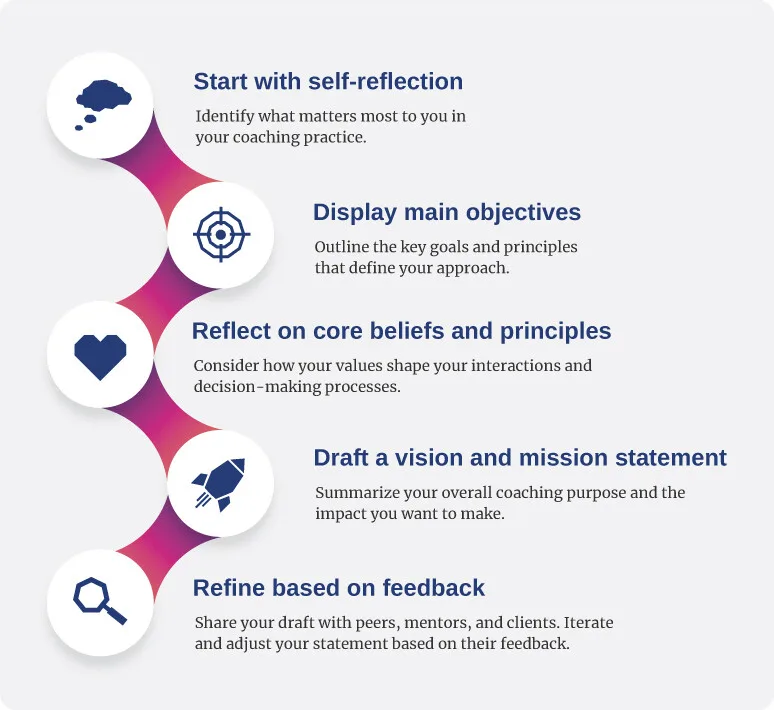Strong and effective transformational coaches operate through more than just the skills and methodology of coaching — they have grown from within to lead authentically from their values and philosophies. Their strong coaching philosophies are foundational to their successful coaching journeys.
A well-defined philosophy helps seasoned coaches stay aligned with their values, deliver consistent results, and create meaningful client relationships as agile leaders. The goal of this guide is to take aspiring and growing coaches through the steps to develop their own coaching philosophy and provide practical examples to inspire their approach.
Register for Co-Active Coaching Fundamentals
Understanding Core Coaching Philosophy
A coaching philosophy refers to a set of values, beliefs, and principles that guide a coach’s approach to working with clients. It shapes how you interact, make decisions, and help clients achieve their goals. Your philosophy is the core of your identity as a coach and ensures consistency and authenticity in your practice so you can help others create meaningful and lasting change in themselves.
Why Do You Need a Coaching Philosophy?
Some of the benefits of defining a coaching philosophy include:
- Clarity and consistency. A well-defined philosophy builds trust with your clients because you offer them a consistent experience.
- Purposeful direction. Clear processes and goals help clients move toward success.
- Self-reflection. A defined philosophy clarifies your motivations and strengths.
- Refinement of coaching style. A clear philosophy will help you flex and fine-tune your coaching methodology over time.
- Client alignment. When you approach your coaching in alignment with your values, you attract and retain clients that resonate with you.
5 Steps to Develop Your Coaching Philosophy
When you are ready to define your philosophy, take time for self-reflective, intentional brainstorming and planning. Approach this time from the ICF (International Coaching Federation) Code of Ethics vantage point of doing good versus avoiding bad.
We suggest these steps:
1. Identify Your Values
Your core values should be the foundation of any coaching philosophy. They define who you are and what matters most to you, which impacts how you lead your clients.
Examples of values include:
- Integrity — Always acting in the best interest of the client
- Empathy — Understanding and addressing client needs compassionately
- Discipline — Staying committed to processes and goals
- Adaptability — The capacity to shift and modify situationally
To discover your core values, ask yourself questions like:
- What moves me to action?
- What motivated me to become a coach?
- What transformations matter most to me?
2. Define Your Purpose and Mission
Your purpose directs your coaching practice, while your mission outlines how you plan to achieve it.
Ask yourself:
- What is my ultimate goal as a coach?
- What am I passionate about?
- What am I uniquely gifted to do?
- How do I want to help my clients achieve their potential?
- What transformation have I experienced that I want others to have?
3. Identify Your Coaching Style
Your coaching style determines how you engage with your clients and deliver valuable, actionable coaching. Common styles include:
- Authoritative — Directing clients with clear guidance and structure
- Collaborative — Working alongside clients to develop solutions
- Facilitative — Encouraging self-discovery and reflection
- Transformational — Working alongside clients to inspire deep, profound change
Assessment questions to identify your style:
- Do I prefer a structured or flexible approach?
- Am I more of a guide or a partner in the coaching process?
- Do I function best with clear, precise direction or an organic, conversational style?
- Do I tend to problem-solve, or help clients unearth their resourcefulness with curiosity?
4. Establish Your Core Practices
Define and develop the strategies, tools, and frameworks you will use to help clients achieve their goals. This step includes:
- Creating structures that align with your values and purpose
- Identifying the right tools, like goal-setting frameworks or progress-tracking techniques
- Developing self-assessment questions to evaluate effectiveness continuously
5. Practice Continuous Growth
Your philosophy will evolve with experience — good and bad — and feedback from others.
Key strategies for growth:
- Seek feedback from clients and peers
- Network and learn from other coaches
- Engage in ongoing professional development
- Reflect on your practice regularly to refine and adapt it over time
How to Write Your Coaching Philosophy
Once you have developed your philosophy, it is time to articulate it clearly. The chart below demonstrates a helpful process to take the brainstorming you have done and craft the language:

Notable Coaching Philosophy Examples
There are endless options for crafting your unique coaching philosophy, but often the best place to start is by following an approach that’s proven to work in specific situations. Below are just four examples of successful coaching philosophies.
Winner’s Mindset Coaching
This philosophy focuses on:
- Driving clients toward success through goal-oriented strategies
- Maintaining a clear focus on achieving defined milestones
- Keeping clients motivated by reinforcing their goals
Example: A sports coach who helps athletes stay committed to their training regimens.
Strength-Based Coaching
This philosophy emphasizes:
- Identifying and leveraging client strengths
- Encouraging clients to build upon their existing skills
- Empowering clients to achieve their goals through their unique abilities
Example: A career coach who helps professionals maximize their natural talents.
Autonomous Coaching
This approach encourages:
- Clients to take ownership of their growth and decisions
- Fostering independence and self-reliance
- Emphasizing self-motivation and reflection
Example: A life coach helping clients build self-confidence and resilience.
Collaborative Coaching
This approach highlights:
- A strong partnership between coach and client
- Joint goal-setting and strategy development
- Promoting shared responsibility in achieving outcomes
Example: A business coach working with teams to improve collaboration and efficiency.
Prepare for Your Coaching Career With Co-Active
Co-Active Training Institute has guided coaches in clarifying their values, methods, and coaching philosophies for transformational coaching careers for over three decades. Are you ready to build your coaching career? Get started by registering for the Co-Active Fundamentals of Coaching course.

